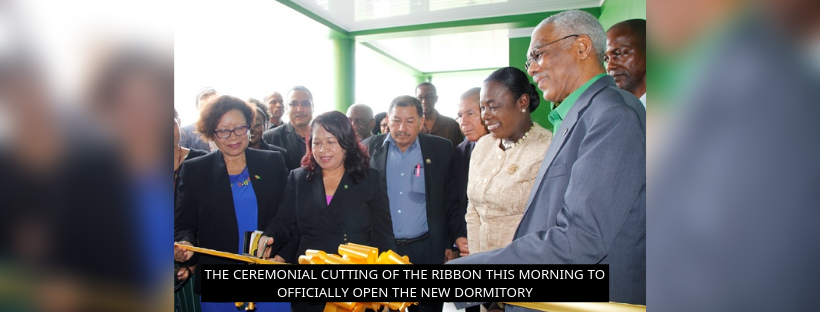The Government of Guyana (GoG), through its Ministry of Indigenous Peoples’ Affairs, has increased the number of hinterland scholarships from 120 in 2014 to 186 in 2018. Hinterland students have also been among the beneficiaries of the 1,599 tertiary-level scholarships offered by the Department of the Public Service since 2015, says President David Granger.
During his address at the Commissioning Ceremony of the Dormitory for Tertiary Hinterland Students in Liliendaal, Greater Georgetown this morning, the Head of State said that access to education is being improved through the provision of these scholarships, which work in tandem with improved expansion and improvement of educational infrastructure.
He noted more than 100 schools, spread across the ten administrative regions, have been built, renovated, and upgraded over the past four years. Sanitation, safe water, and solid waste facilities – too long unsatisfactory in schools – are being improved.
The President said also that hinterland students have benefitted from learning resource centres at Aishalton, Annai, Bartica, Kato, Lethem, Mabaruma, Monkey Mountain, Paramakatoi, Kamarang, Waramadong, and Wauna. Monies have also been budgeted for the commencement of work on learning resource centres at Mahdia and Port Kaituma.
Switching his attention to Information Communications Technology (ICT), he noted that this subject area is being boosted by the establishment of centres which focus on increasing access to modern education.
“ICT hubs have been established in 171 communities, including the hinterland communities of Aishalton, Annai, Baramita, Bartica, Iwokrama, Kato, Karasabai, Masakenari, Port Kaituma, Mabaruma, Matthew’s Ridge, Mahdia, Paramakatoi, Sand Creek, Santa Rosa, St. Ignatius and Waramadong,” he said.
Touching on the importance of student attendance, the Head of State noted that the Public Education Transportation Service (PETS), which started as the “3Bs” project, has provided 29 buses, 10 boats, and more than 1,400 bicycles to help children attend school within the last four years.
“Attendance at school is equally important. Government’s policy is to ensure that every child attends school and stays in school…School attendance is being boosted by the provision of transportation. The sight of children having to paddle canoes to school might look pretty on postcards but it is physically exhausting for the children in the 21st century. Long distances, especially in some riverine communities, can be a disincentive to learning.
Children who have to paddle for hours or walk several kilometres will be too tired to study when they reach school and will be too tired to do their homework when they reach home,” The President told attendees at the ceremony.













